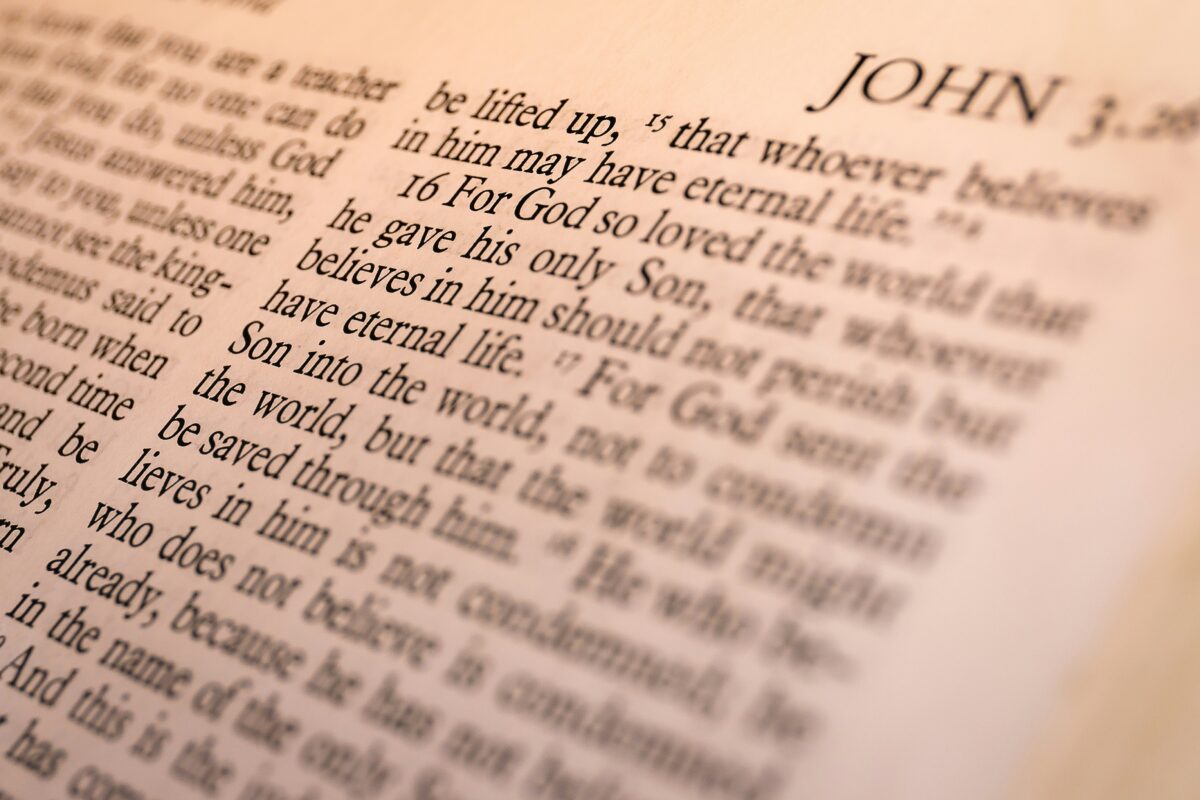A Double Take on John 3:16

Gospel
To explain the salvation of God to the religious leader, Nicodemus, Jesus refers to the scripture passage quoted in today’s first reading. Just as those who looked upon the bronze serpent were healed, so people will be saved when they behold Christ lifted up on the cross.
The Holy Gospel according to St. John, the 3rd chapter.
Glory to you, O Lord.
[Jesus said:] 14“Just as Moses lifted up the serpent in the wilderness, so must the Son of Man be lifted up, 15that whoever believes in him may have eternal life.
16“For God so loved the world that he gave his only Son, so that everyone who believes in him may not perish but may have eternal life.
17“Indeed, God did not send the Son into the world to condemn the world, but in order that the world might be saved through him. 18Those who believe in him are not condemned; but those who do not believe are condemned already, because they have not believed in the name of the only Son of God. 19And this is the judgment, that the light has come into the world, and people loved darkness rather than light because their deeds were evil. 20For all who do evil hate the light and do not come to the light, so that their deeds may not be exposed. 21But those who do what is true come to the light, so that it may be clearly seen that their deeds have been done in God.”
The Gospel of our Lord. Praise to you, O Christ.
Double Take on John 3:16
Grace to you and peace from God our Creator, from our Risen Lord and Savior, Jesus Christ and from our Sustainer, the Holy Spirit. Amen.
John 3:16. No doubt the most well-known, most quoted, most famous scripture verse in the New Testament – and may I add, the most misused verse in all of Christianity. John 3:16. It pops up on signs at sporting events. We just heard the New Revised Standard Version – the translation we Lutherans use most.
However, I’d like to share with you, the King James Version of John 3:16 – you know, the old fashioned English version of the Bible. It goes like this, “For God so loved the world, that he gave his only begotten Son, that whosoever believeth in him should not perish, but have everlasting life.” Hear a seemingly slight difference? From “everyone who believes in him” to “whosoever believeth in him.” Everyone – to – whosoever. To me, everyone sounds like certain, particular people who “get it.” Whosoever, on the other hand, sounds like it could be anyone – anyone in the whole wide world, even the most unlikely of people.
Take Mary MacLeod Bethune, for example, who lived from 1875 – 1955 and who was, at the time, the most prominent black woman in America – not unlike today’s Michelle Obama or Oprah Winfrey – without the wealth. There’s a delightful introduction of Mary Bethune written by the black poet and social activist, Langston Hughes.
In his 1956 autobiography, titled I Wonder as I Wander, Langston Hughes recalled being invited by Mary Bethune to give a reading at Bethune-Cookman College in 1929 [a college which she co-founded.] After the event [in Florida] Bethune hitched a ride with the young poet back to New York City. In the time of Jim Crow, where Black travelers were required to carry an Automobile Blue Book that listed the… [few and far-between places where]… African Americans were allowed to stop for meals, restrooms, or for sleeping accommodations, Hughes noted that Bethune avoided much of the indignity of segregated facilities along the long road to New York. He said, “Colored people along the eastern seaboard spread a feast and opened their homes wherever Mrs. Bethune passed their way.” In fact, he continued, “chickens, sensing that she was coming, went flying off frantically seeking a hiding place. They knew a heaping platter of southern fried chicken would be made in her honor.”
Even the chickens knew of her prominence! And it was a remarkable life of service for 60 years. She was an educator, a community organizer, a public policy advisor, a public health advocate, an advisor to President Franklin Roosevelt, a close friend to Eleanor Roosevelt. She was a patriot and mother and grandmother.
She founded a school in Florida that later became Bethune- Cookman College. She served as President of the National Association of Colored Women and the National Association of Teachers in Colored Schools. She founded the National Council of Negro Women. At one time she was the highest paid African American in government in the Roosevelt administration, and she served as special assistant to the Secretary of War during WWII recruiting Black women for officer training. The list of service goes on and on.
It was as a young girl that she came across John 3:16. Now, mind you, she grew up on a farm in South Carolina – the 15th of 17 children – children of former slaves who owned their own farm – at a time when the Jim Crow way of life was just beginning to take hold and would plague the south with anti-Black violence for her entire life. Her parents, former slaves, were deeply religious. They encouraged their curious daughter to attend a mission school where she thrived. The young Mary McLeod became so passionate about learning that she won a scholarship to Scotia Seminary for Negro Girls in Concord, North Carolina, and spent one year at the Moody Bible Institute in Chicago, Illinois. It was during this formative time that she came across John 3:16 – the King James Version – and it changed her life.
In her own words, Mary Bethune wrote this near the end of her life, “With these words [from John 3:16], the scales fell from my eyes and the light came flooding in. My sense of inferiority, my fear of handicaps, dropped away. ‘Whosoever [believeth in him]’ it said. No Jew nor Gentile, no Catholic nor Protestant, no black nor white; just ‘whosoever.’ It means that I, a humble Negro girl, had just as much chance as anybody in the sight and love of God. These words stored up a battery of faith and confidence and determination in my heart, which has not failed me to this day.”
Do you hear how she, first, came to believe and second how she defines belief? First, she came to believe because she heard in John 3:16 that God had God’s eyes set on her –on her of all people, on her in particular! A young black girl raised by former slaves in a culture that actively sought to eliminate the likes of her from the face of the earth. In John 3:16 she heard in that one word “whosoever” that God chose her –of all people, and at that moment she felt seen, she felt heard, she felt loved and she felt alive – so much so that she was filled with faith and confidence and determination.
Second do you hear how she defines faith? It’s not about a passive, private, one-on-one belief in God. It’s not about dividing people up into whoever believes will have eternal life and who ever does not believe goes to a place called hell. That’s a terrible misuse of John 3:16 when used to divide and conquer – those who are in and those who are out – sending a message that “I’m better than you. God loves me. Not you. I’m in God’s good graces and therefore powerful, and you are not in God’s good graces and therefore you are powerless. In fact you are inferior to me.” Another misuse of John 3:16.
Instead Mary MacLeod Bethune describes her faith as a life of literally being the light of Christ for others, of actively making a difference in the lives of others, of actively improving the life of others – all because she herself had seen the light! Her faith is not about just getting it right between her and God in a private one-on-one intimate relationship. Rather faith is full of stumbles and doubts and questions while having the courage to swim upstream against injustices and hardships. Faith is full of stumbles and doubts and question while making decisions to improve the lives of others – sharing the light! Sitting still with a private, intimate relationship with God is not an option for her. In the face of so much suffering in the world, neutrality and indecision are not options for her.
As one commentator put it – and you will notice the reference to our first lesson this morning from the book of numbers, “The roads of this world are often filled with venomous snakes and people are weary.” Just think of our politics – filled with venomous snakes. Just think of the evil of war – filled with venomous snakes. Just think of our own country, the wealthiest in the world –filled with venomous snakes as evident by the fact that 1 in 5 children go hungry every day.
The roads of this world are often filled with venomous snakes. The work of the church is to lift up Jesus – to be Jesus – so that those who need healing can find it, those who need food can find it, those who need peace can find it, those who need love can find it, and those who need forgiveness can find it. That’s the work of the church. That’s what Mary MacLeod Bethune’s faith is all about. That’s what John 3:16 is all about.
Last Sunday during the children’s message I asked the children what the greatest commandment is – and they knew it! “To love the Lord God with all our heart, soul and mind.” I then asked what the second greatest commandment is and they knew it. “To love your neighbor as yourself.” But that’s not enough! But that’s not all! So I asked the children one more question, “How do you show your love for your neighbor?” And little Alice quickly race her hand. I called on her and she said, “Give them a hug!” Give them a hug! She wanted to do something with her beautiful faith! That’s John 3:16 in action.
God was not done with Jesus when he died that painful death on the cross. No. God then took action. God was not done with Jesus after they laid his lifeless body in a tomb. No. God then took action. God raised him from the dead so that we live and take action. John 3:16. Amen.
Sources:
- The National World War II Museum, New Orleans website – Profile
- The Christian Century, March 9, 2024
- Working Preacher, Alicia Vargas, March 10, 2024

